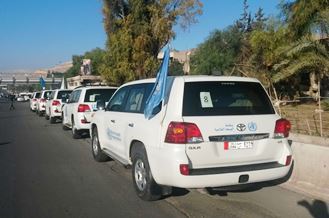 Joint statement Dr Ala Alwan WHO Regional Director and Dr Peter Salama, UNICEF Regional Director
Joint statement Dr Ala Alwan WHO Regional Director and Dr Peter Salama, UNICEF Regional Director
Amman/Cairo, 14 January 2016 – This week’s delivery of urgently needed humanitarian supplies1 to the besieged communities of Madaya, Foua’a and Kafraya is a welcome step for a population in desperate need.
During the mission to Madaya, our teams met many distressed and hungry children - some of them severely malnourished, along with adults in a similar condition. The town’s population of 40 000 is being served by only two doctors, with a limited capacity to save the lives of civilians. Health and medical services, including immunization, are collapsing. Young children in Madaya have not been vaccinated against polio, measles and other diseases for close to 10 months.
Madaya is by no means unique. Across Syria, civilian areas are being held under siege in 15 different locations2 by various parties to the conflict. Around 400 000 people have been trapped inside these areas, sometimes for years on end, with highly constrained access to food, clean water, health and other basic services. Lives have been lost as a result, among children and the elderly in particular.
Elsewhere in the country, more than 4 million people live in hard-to-reach areas with only sporadic access to humanitarian supplies. Siege and the denial of humanitarian access to civilians continue to be used as a tactic of war in violation of international humanitarian law.
Malnutrition is a particular threat to children and people with chronic diseases trapped in these areas, making them more vulnerable to disease and longer term under-development. Meanwhile, mothers who are malnourished are more likely to have malnourished children.
Unless humanitarian assistance is delivered promptly and on a regular basis to all besieged and hard-to-reach areas of Syria, malnutrition levels will continue to increase and more lives will be lost.
The access granted for limited deliveries of humanitarian supplies is not enough. The immediate lifting of sieges in Syria is required, followed by assessments of health and other needs of the population, the provision of on-site medical and nutritional therapeutic care and the evacuation of the wounded and sick to be treated.
WHO and UNICEF appeal to all parties to the conflict to respect their obligations under international humanitarian law to allow and facilitate immediate and uninterrupted humanitarian access to all areas throughout the country.
For more information
Juliette Touma
UNICEF Regional Office
Cette adresse email est protégée contre les robots des spammeurs, vous devez activer Javascript pour la voir.
+962-79-864-7628
Rana Sidani
WHO Regional Office
Cette adresse email est protégée contre les robots des spammeurs, vous devez activer Javascript pour la voir.
+20 1099756506
1On Monday 11 January UNICEF and WHO participated in two inter-agency convoys that delivered much needed supplies to Madaya, Fou’a and Kafraya
UNICEF delivered therapeutic and other nutrition supplies that included multiple micronutrients, high energy biscuits and therapeutic food and medication for the treatment of severe and moderate malnutrition.
WHO provided 7.8 tonnes of medicines, medical and surgical supplies to Madaya and 3.9 tonnes to Foah and Kafray. It contained therapeutic food, antibiotics and medicines for noncommunicable diseases.
2Report of the Secretary- General on the implementation of the Security Council resolution 2139 (2014), 2165 (2014) and 2191 (2014), December 2015.





